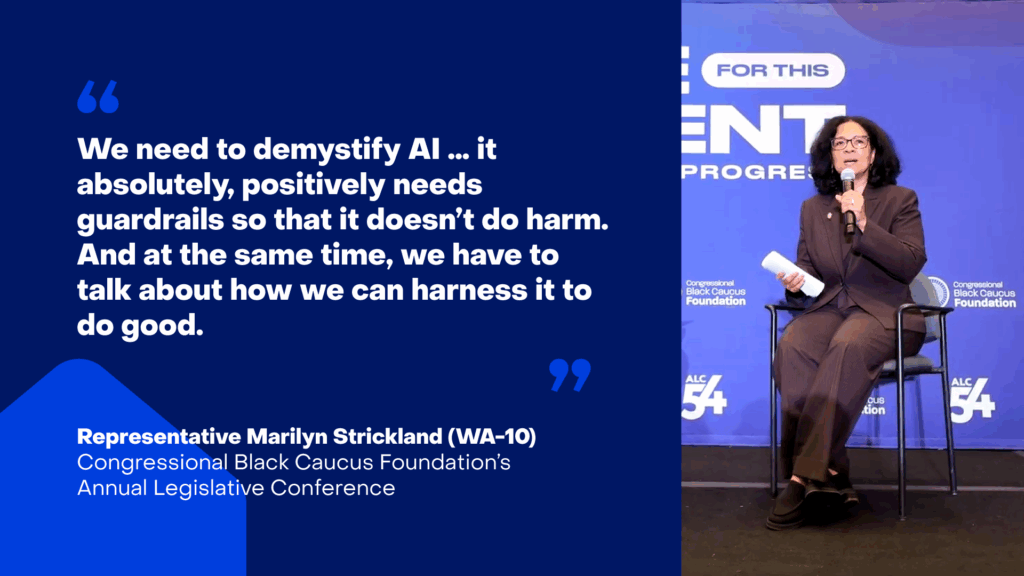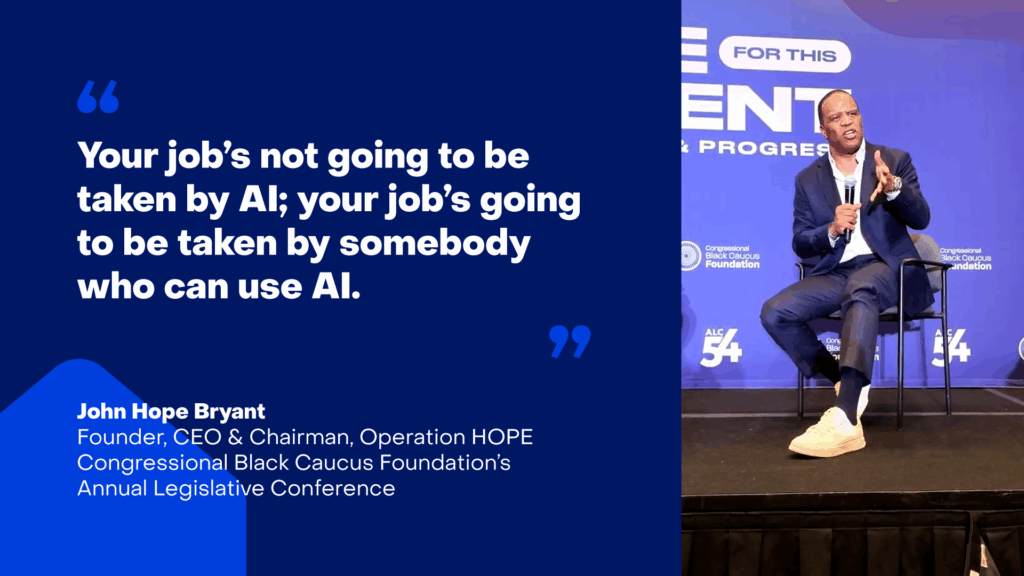At the Congressional Black Caucus Foundation’s Annual Legislative Conference last month in Washington, D.C., policymakers, advocates and industry leaders gathered to explore how artificial intelligence can shape the future of housing. Zillow hosted the panel and pressed a critical question: Will AI reinforce inequities that have held communities back for generations, or will it expand access to housing and wealth-building opportunities?
U.S. Rep. Marilyn Strickland of Washington state, New York State Assembly Member Clyde Vanel, nonprofit leader John Hope Bryant and Zillow Vice President Jennifer Butler made the case for AI’s role in fair housing. They highlighted the practical ways that technology already combats discrimination and systemic barriers in housing, and they urged policymakers and innovators to set strong guardrails that ensure fairness and accountability.
‘Demystify AI … and harness it to do good’
Strickland set the tone with a direct charge: “We need to demystify AI … it absolutely, positively needs guardrails so that it doesn’t do harm. And at the same time, we have to talk about how we can harness it to do good.”
She also pointed to tangible equity use cases. “Can we use AI to track lenders who have engaged in discriminatory practices?” she asked. Strickland urged leaders to analyze neighborhood patterns and school outcomes with AI, then bring “receipts” to policy debates. She also challenged U.S. housing norms. Multigenerational living builds wealth in many cultures, she said, and AI can surface global best practices for homes that support “anyone from the age of 4 to 84.”

Lawmaking with — and for — AI
Vanel, who chairs the New York assembly’s Subcommittee on Internet and New Technologies, described using AI in lawmaking. He introduced what may be the first AI-drafted bill in the United States — a tenant protection law that requires landlords to provide lease copies — after asking an AI agent to identify a gap in New York state law. “I didn’t tell it exactly what to do … it came up with [a gap] that was not there in the law,” he said. Some colleagues pushed back, yet Vanel stayed focused: “If we don’t master this technology, we’ll be left behind faster than ever before.”
Vanel also proposed a high-risk AI licensing framework for sensitive domains such as housing, finance and justice. He ties regulation to empowerment: “We have to make sure that folks … are able to buy a home, at least even in the neighborhoods they grew up in.”
AI literacy equals economic power
Entrepreneur and nonprofit leader John Hope Bryant tied AI literacy directly to economic opportunity and housing access. “Your job’s not going to be taken by AI; your job’s going to be taken by somebody who can use AI,” he said. Bryant urged policymakers and communities to treat AI as a co-creator that expands access to financial knowledge and homeownership, rather than as a threat.
He explained that AI-powered financial tools can help families strengthen credit, reduce debt and move from “no” to “yes” in mortgage lending — an essential step toward closing racial homeownership gaps. “AI can do basic financial literacy coaching better than we can,” he said, noting that when people understand their credit and build savings, they gain the confidence and eligibility needed to buy a home.
Bryant called on leaders to ensure that communities of color have the same access to AI education, financial tools and resources as other groups. He argued that pairing AI innovation with ethical oversight and community investment can dismantle the structural barriers that have long limited who gets to own a home — and who gets left behind.

Policy, product and partnerships: Zillow’s work toward fairer outcomes
Jennifer Butler, Zillow’s vice president of Government and Community Relations, outlined how Zillow pairs research with product design and policy advocacy to lower housing barriers.
- Lower upfront costs for renters. Zillow research found that renters of color pay more in application fees than white renters. “We used that to create a universal application — one flat fee for as many applications as you want in a 30-day period,” Butler said. In New York City, broker-fee reform now saves renters roughly $5,000 in upfront costs.
- Data-informed advocacy for access and supply. Butler urged leaders to tackle affordability and availability. She cited exclusionary zoning’s legacy and the need to “build the middle — ADUs, duplexes, triplexes — so we have options for all of us.”
- Guardrails for AI in real estate. Early large language models (LLMs) did not consider fair housing requirements in conversations with users, so Zillow built and open-sourced a fair housing classifier to mitigate the risk of illegal steering. The tool is available to anyone. Zillow pairs it with an ethical AI team, reviews that bring humans into the loop, and principles that emphasize fairness, inclusion, safety and transparency. Longstanding tools aim for clarity too. “On the Zestimate … you can actually look to see how we calculate the estimate,” Butler said.
The stakes remain high. “The average Black household can only afford 18% of the available market right now,” Butler said. Responsible AI and strong policy can widen access by cutting friction, bias and costs across the housing journey.
Where AI already helps — and what to do next
AI is already helping build a fairer housing market — when designed, governed and deployed responsibly. Zillow’s open-source fair housing classifier shows how guardrails can reduce bias across housing conversations. Policy shifts such as universal rental applications and fee caps cut costs that often fall hardest on renters of color. And lawmakers are already demonstrating how AI can spot gaps in housing protections and drive reforms that keep equity at the center.
Policymakers now have a chance to build on this momentum. They can codify fairness in housing AI, set clear rules for sensitive use cases, and promote tools that cut renter costs and boost transparency. They can also fund AI literacy so that families, landlords and communities know how to use these technologies; and they can advance zoning reforms that expand affordable supply.
Zillow remains committed to open-sourcing bias protections, embedding ethical oversight and sharing research to shape better policy and products. With the right safeguards and collaboration, AI can help create a housing market that is more affordable, fair and inclusive for everyone.